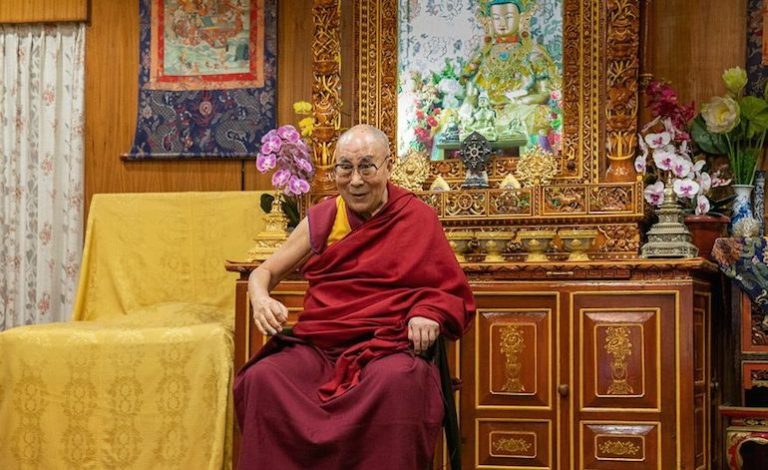Nothing is permanent, so everything is precious. Here’s a selection of some happenings—fleeting or otherwise—in the Buddhist world this week.
Dalai Lama Anticipates a Longer Life
His Holiness the 14th Dalai Lama says he’s looking forward to living another “15, 20 years,” according to the Central Tibetan Administration. The 83-year-old Tibetan Buddhist leader made the remark in Dharamshala this week during a teleconference with Australian Buddhists. “I often ask people . . . what they think of my age. They make a guess around 70. Then I tell them that I am in 80s . . . They say I look very young,” he said, adding that his teeth and voice are both still strong. There is a history of Buddhist teachers predicting their own death. In Tibetan Buddhism and medicine, practitioners are taught to pay attention to the omens of death.
Man Attacks “Devil Worship” Temple
A man shouted “devil worshippers” before destroying a $3,000 statue at a Buddhist temple in Tacoma, Washington, the News Tribune reports. Authorities identified the vandal as Jeremy Clarke, 35, who was captured on video taken by a monk at the Vietnamese Buddhist Meditation Center. Clarke also tried to chain a column to his car in an apparent attempt to collapse the building. Clarke allegedly told investigators that “God called him,” adding, “They are obviously devil worshipers; have you seen that statue?” He was charged with second-degree malicious mischief and held in lieu of $15,000 bail, according the the News Tribune.
Scholars Restore Buddhist Canon
Japanese and Chinese scholars have reprinted a Tripitaka, or collection of Buddhist canonical texts, that dates back to the Song Dynasty (960–1279), ECNS reports. The 5,500-volume Tripitaka, titled Sixizang, was wrecked during a war, but another set of the texts was preserved at a Japanese temple and was used to reconstruct the complete collection. “Japanese scholars made arduous efforts to make the project possible,” Li Jining, a scholar from National Library of China, told ECNS. “It will not only produce a complete collection of Buddhist classics, but serve as a landmark in the history of Sino-Japanese cultural exchange.”
Congrats to Sallie Tisdale!
Longtime Tricycle contributor and palliative-care nurse Sallie Tisdale’s new book Advice for Future Corpses received a glowing review in The New York Times this week. While many books on death and dying share a “dreadful, unremarked upon sameness,” writes Parul Sehgal, Advice for Future Corpses is a “wild and brilliantly deceptive book.” Tisdale discussed her book with Tricycle in our Summer 2018 issue.
Hitler is Not Buddhist
A senior Buddhist monk in Sri Lanka called on a presidential candidate to emulate Adolf Hitler by creating a military state. Chief priest of the Asgiriya chapter, Vendaruwe Upali, made the comment while blessing former defence secretary Gotabhaya Rajapaksa on his birthday. “As the clergy, we feel the country needs a religious leader . . . Some people have described you as a Hitler,” Vendaruwe Upali said, according to economynext.com. “Be a Hitler. Go with the military and take the leadership of this country.” Sri Lanka’s Prime Minister Ranil Wickremesinghe responded to the remark, saying that he would have condemned it immediately had he been present. “There is no way Buddhism and Hitler’s brutality can be reconciled,” he said, “as Buddhists such a thing is against our dhamma.”
University of Michigan Gets Tibetan Buddhist Studies Grant
The University of Michigan has received a $2.5 million grant to create the Khyentse Gendun Chopel Professorship of Tibetan Buddhist Studies. The donation from the Khyentse Foundation is the largest grant promoting Tibetan Buddhism in North America, according to a foundation statement. “Michigan has a long and distinguished tradition of excellence in the field of Buddhist studies,” said Donald Lopez, chair of Asian languages and cultures and the Arthur E. Link Distinguished Professor of Buddhist and Tibetan Studies at the university. “This historic gift will allow us to expand both our undergraduate and our graduate programs in new directions.”
Thank you for subscribing to Tricycle! As a nonprofit, we depend on readers like you to keep Buddhist teachings and practices widely available.
